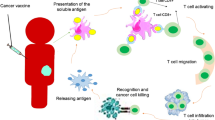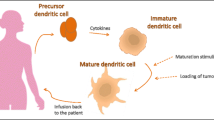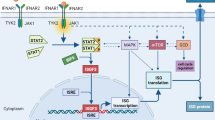Abstract
Recent findings show that immune cells constitute a large fraction of the tumor microenvironment and that they modulate tumor progression. Clinical data indicate that chronic inflammation is present at tumor sites and that IL-4, in particular, is upregulated. Thus, we tested whether IL-4 neutralization would affect tumor immunity. Current results demonstrate that the administration of a neutralizing antibody against IL-4 enhances anti-tumor immunity and delays tumor progression. IL-4 blockade also alters inflammation in the tumor microenvironment, reducing the generation of both immunosuppressive M2 macrophages and myeloid-derived suppressor cells, and enhancing tumor-specific cytotoxic T lymphocytes. In addition, IL-4 blockade improves the response to anti-OX40 Ab or CpG oligodeoxynucleotide immunotherapies. These findings suggest that IL-4 affects anti-tumor immunity and constitutes an attractive therapeutic target to reduce immune suppression in the tumor microenvironment, thus enhancing the efficacy of cancer therapy.






Similar content being viewed by others
Abbreviations
- Arg 1:
-
Arginase 1
- CFSE:
-
Carboxyfluorescein succinimidyl ester
- EGF:
-
Epidermal growth factor
- GZMB:
-
Granzyme B
- IFNg:
-
IFN-gamma
- MDSC:
-
Myeloid-derived suppressor cells
- NOS2:
-
Nitric oxide synthase 2
- ODN:
-
Oligodeoxynucleotides
- TAM:
-
Tumor-associated macrophages
- Tfh cells:
-
T follicular helper cells
- Treg cell:
-
Regulatory T cell
- VEGF:
-
Vascular endothelial growth factor
References
Zitvogel L, Tesniere A, Kroemer G (2006) Cancer despite immunosurveillance: immunoselection and immunosubversion. Nat Rev Immunol 6(10):715–727. doi:10.1038/nri1936
Muller AJ, Scherle PA (2006) Targeting the mechanisms of tumoral immune tolerance with small-molecule inhibitors. Nat Rev Cancer 6(8):613–625. doi:10.1038/nrc1929
Allavena P, Sica A, Solinas G, Porta C, Mantovani A (2008) The inflammatory micro-environment in tumor progression: the role of tumor-associated macrophages. Crit Rev Oncol Hematol 66(1):1–9. doi:10.1016/j.critrevonc.2007.07.004
Locati M, Mantovani A, Sica A (2013) Macrophage activation and polarization as an adaptive component of innate immunity. Adv Immunol 120:163–184. doi:10.1016/B978-0-12-417028-5.00006-5
Fujimoto J, Sakaguchi H, Aoki I, Tamaya T (2000) Clinical implications of expression of interleukin 8 related to angiogenesis in uterine cervical cancers. Cancer Res 60(10):2632–2635
Nishie A, Ono M, Shono T, Fukushi J, Otsubo M, Onoue H, Ito Y, Inamura T, Ikezaki K, Fukui M, Iwaki T, Kuwano M (1999) Macrophage infiltration and heme oxygenase-1 expression correlate with angiogenesis in human gliomas. Clin Cancer Res 5(5):1107–1113
Lissbrant IF, Stattin P, Wikstrom P, Damber JE, Egevad L, Bergh A (2000) Tumor associated macrophages in human prostate cancer: relation to clinicopathological variables and survival. Int J Oncol 17(3):445–451
Leek RD, Lewis CE, Whitehouse R, Greenall M, Clarke J, Harris AL (1996) Association of macrophage infiltration with angiogenesis and prognosis in invasive breast carcinoma. Cancer Res 56(20):4625–4629
Lee AH, Happerfield LC, Bobrow LG, Millis RR (1997) Angiogenesis and inflammation in invasive carcinoma of the breast. J Clin Pathol 50(8):669–673
Hanada T, Nakagawa M, Emoto A, Nomura T, Nasu N, Nomura Y (2000) Prognostic value of tumor-associated macrophage count in human bladder cancer. Int J Urol 7(7):263–269
Mantovani A, Sozzani S, Locati M, Allavena P, Sica A (2002) Macrophage polarization: tumor-associated macrophages as a paradigm for polarized M2 mononuclear phagocytes. Trends Immunol 23(11):549–555
Wang HW, Joyce JA (2010) Alternative activation of tumor-associated macrophages by IL-4: priming for protumoral functions. Cell Cycle 9(24):4824–4835. doi:10.4161/cc.9.24.14322
Pedroza-Gonzalez A, Xu K, Wu TC, Aspord C, Tindle S, Marches F, Gallegos M, Burton EC, Savino D, Hori T, Tanaka Y, Zurawski S, Zurawski G, Bover L, Liu YJ, Banchereau J, Palucka AK (2011) Thymic stromal lymphopoietin fosters human breast tumor growth by promoting type 2 inflammation. J Exp Med 208(3):479–490. doi:10.1084/jem.20102131
Nevala WK, Vachon CM, Leontovich AA, Scott CG, Thompson MA, Markovic SN, Melanoma Study Group of the Mayo Clinic Cancer C (2009) Evidence of systemic Th2-driven chronic inflammation in patients with metastatic melanoma. Clin Cancer Res 15(6):1931–1939. doi:10.1158/1078-0432.CCR-08-1980
Gao J, Wu Y, Su Z, Amoah Barnie P, Jiao Z, Bie Q, Lu L, Wang S, Xu H (2014) Infiltration of alternatively activated macrophages in cancer tissue is associated with MDSC and Th2 polarization in patients with esophageal cancer. PLoS One 9(8):e104453. doi:10.1371/journal.pone.0104453
Baier PK, Wolff-Vorbeck G, Eggstein S, Baumgartner U, Hopt UT (2005) Cytokine expression in colon carcinoma. Anticancer Res 25(3B):2135–2139
Li J, Wang Z, Mao K, Guo X (2014) Clinical significance of serum T helper 1/T helper 2 cytokine shift in patients with non-small cell lung cancer. Oncol Lett 8(4):1682–1686. doi:10.3892/ol.2014.2391
Shirota H, Klinman DM, Ito SE, Ito H, Kubo M, Ishioka C (2017) IL4 from T follicular helper cells downregulates antitumor immunity. Cancer Immunol Res 5(1):61–71. doi:10.1158/2326-6066.CIR-16-0113
Todaro M, Alea MP, Di Stefano AB, Cammareri P, Vermeulen L, Iovino F, Tripodo C, Russo A, Gulotta G, Medema JP, Stassi G (2007) Colon cancer stem cells dictate tumor growth and resist cell death by production of interleukin-4. Cell Stem Cell 1(4):389–402. doi:10.1016/j.stem.2007.08.001
Li Z, Jiang J, Wang Z, Zhang J, Xiao M, Wang C, Lu Y, Qin Z (2008) Endogenous interleukin-4 promotes tumor development by increasing tumor cell resistance to apoptosis. Cancer Res 68(21):8687–8694. doi:10.1158/0008-5472.CAN-08-0449
DeNardo DG, Barreto JB, Andreu P, Vasquez L, Tawfik D, Kolhatkar N, Coussens LM (2009) CD4+ T cells regulate pulmonary metastasis of mammary carcinomas by enhancing protumor properties of macrophages. Cancer Cell 16(2):91–102. doi:10.1016/j.ccr.2009.06.018
Terabe M, Matsui S, Noben-Trauth N, Chen H, Watson C, Donaldson DD, Carbone DP, Paul WE, Berzofsky JA (2000) NKT cell-mediated repression of tumor immunosurveillance by IL-13 and the IL-4R-STAT6 pathway. Nat Immunol 1(6):515–520. doi:10.1038/82771
Shirota H, Klinman DM (2011) CpG-conjugated apoptotic tumor cells elicit potent tumor-specific immunity. Cancer Immunol Immunother 60(5):659–669. doi:10.1007/s00262-011-0973-y
Pulaski BA, Terman DS, Khan S, Muller E, Ostrand-Rosenberg S (2000) Cooperativity of Staphylococcal aureus enterotoxin B superantigen, major histocompatibility complex class II, and CD80 for immunotherapy of advanced spontaneous metastases in a clinically relevant postoperative mouse breast cancer model. Cancer Res 60:2710–2715
Shirota Y, Shirota H, Klinman DM (2012) Intratumoral injection of CpG oligonucleotides induces the differentiation and reduces the immunosuppressive activity of myeloid-derived suppressor cells. J Immunol 188(4):1592–1599. doi:10.4049/jimmunol.1101304
Aspeslagh S, Postel-Vinay S, Rusakiewicz S, Soria JC, Zitvogel L, Marabelle A (2016) Rationale for anti-OX40 cancer immunotherapy. Eur J Cancer 52:50–66. doi:10.1016/j.ejca.2015.08.021
Sugamura K, Ishii N, Weinberg AD (2004) Therapeutic targeting of the effector T-cell co-stimulatory molecule OX40. Nat Rev Immunol 4(6):420–431. doi:10.1038/nri1371
Shirota H, Tross D, Klinman DM (2015) CpG oligonucleotides as cancer vaccine adjuvants. Vaccines (Basel) 3(2):390–407. doi:10.3390/vaccines3020390
Shirota H, Klinman DM (2014) Recent progress concerning CpG DNA and its use as a vaccine adjuvant. Expert Rev Vaccines 13(2):299–312. doi:10.1586/14760584.2014.863715
Villacres MC, Bergmann CC (1999) Enhanced cytotoxic T cell activity in IL-4-deficient mice. J Immunol 162(5):2663–2670
Ostrand-Rosenberg S, Sinha P (2009) Myeloid-derived suppressor cells: linking inflammation and cancer. J Immunol 182(8):4499–4506. doi:10.4049/jimmunol.0802740
Prokopchuk O, Liu Y, Henne-Bruns D, Kornmann M (2005) Interleukin-4 enhances proliferation of human pancreatic cancer cells: evidence for autocrine and paracrine actions. Br J Cancer 92(5):921–928. doi:10.1038/sj.bjc.6602416
Venmar KT, Carter KJ, Hwang DG, Dozier EA, Fingleton B (2014) IL4 receptor ILR4α regulates metastatic colonization by mammary tumors through multiple signaling pathways. Cancer Res 74(16):4329–4340. doi:10.0008-5472.CAN-14-0093
Yang CY, Liu HW, Tsai YC, Tseng JY, Liang SC, Chen CY, Lian WN, Wei MC, Lu M, Lu RH, Lin CH, Jiang JK (2015) Interleukin-4 receptor-targeted liposomal doxorubicin as a model for enhancing cellular uptake and antitumor efficacy in murine colorectal cancer. Cancer Biol Ther 16(11):1641–1650. doi:10.1080/15384047.2015.1095397
Serafini P, Mgebroff S, Noonan K, Borrello I (2008) Myeloid-derived suppressor cells promote cross-tolerance in B-cell lymphoma by expanding regulatory T cells. Cancer Res 68(13):5439–5449. doi:10.1158/0008-5472.CAN-07-6621
Riabov V, Gudima A, Wang N, Mickley A, Orekhov A, Kzhyshkowska J (2014) Role of tumor associated macrophages in tumor angiogenesis and lymphangiogenesis. Front Physiol 5:75. doi:10.3389/fphys.2014.00075 eCollection 2014
Valkovic T, Dobrila F, Melato M, Sasso F, Rizzardi C, Jonjic N (2002) Correlation between vascular endothelial growth factor, angiogenesis, and tumor-associated macrophages in invasive ductal breast carcinoma. Virchows Arch 440(6):583–588. doi:10.1007/s004280100458
Shieh YS, Hung YJ, Hsieh CB, Chen JS, Chou KC, Liu SY (2009) Tumor-associated macrophage correlated with angiogenesis and progression of mucoepidermoid carcinoma of salivary glands. Ann Surg Oncol 16(3):751–760. doi:10.1245/s10434-008-0259-6
Ries CH, Hoves S, Cannarile MA, Ruttinger D (2015) CSF-1/CSF-1R targeting agents in clinical development for cancer therapy. Curr Opin Pharmacol 23:45–51. doi:10.1016/j.coph.2015.05.008
Vicari AP, Chiodoni C, Vaure C, Ait-Yahia S, Dercamp C, Matsos F, Reynard O, Taverne C, Merle P, Colombo MP, O’Garra A, Trinchieri G, Caux C (2002) Reversal of tumor-induced dendritic cell paralysis by CpG immunostimulatory oligonucleotide and anti-interleukin 10 receptor antibody. J Exp Med 196(4):541–549
Cai X, Yin Y, Li N, Zhu D, Zhang J, Zhang CY, Zen K (2012) Re-polarization of tumor-associated macrophages to pro-inflammatory M1 macrophages by microRNA-155. J Mol Cell Biol 4(5):341–343. doi:10.1093/jmcb/mjs044
Shiao SL, Ruffell B, DeNardo DG, Faddegon BA, Park CC, Coussens LM (2015) TH2-polarized CD4+ T cells and macrophages limit efficacy of radiotherapy. Cancer Immunol Res 3(5):518–525. doi:10.1158/2326-6066.CIR-14-0232
Takeuchi T, Ueki T, Sasaki Y, Kajiwara T, Li B, Moriyama N, Kawabe K (1997) Th2-like response and antitumor effect of anti-interleukin-4 mAb in mice bearing renal cell carcinoma. Cancer Immunol Immunother 43(6):375–381
Tourangeau LM, Kavanaugh A, Wasserman SI (2011) The role of monoclonal antibodies in the treatment of severe asthma. Ther Adv Respir Dis 5(3):183–194. doi:10.1177/1753465811400489
Topalian SL, Drake CG, Pardoll DM (2015) Immune checkpoint blockade: a common denominator approach to cancer therapy. Cancer Cell 27(4):450–461. doi:10.1016/j.ccell.2015.03.001
Author information
Authors and Affiliations
Corresponding author
Ethics declarations
Conflict of interest
The authors declare no conflicts of interests.
Funding
This work was supported by the Ministry of Education, Culture, Sports, Science and Technology (MEXT) KAKENHI Grant No. 25430103 and 16K07106, Japan.
Rights and permissions
About this article
Cite this article
Ito, Se., Shirota, H., Kasahara, Y. et al. IL-4 blockade alters the tumor microenvironment and augments the response to cancer immunotherapy in a mouse model. Cancer Immunol Immunother 66, 1485–1496 (2017). https://doi.org/10.1007/s00262-017-2043-6
Received:
Accepted:
Published:
Issue Date:
DOI: https://doi.org/10.1007/s00262-017-2043-6




